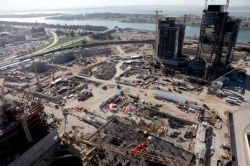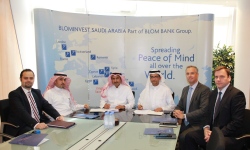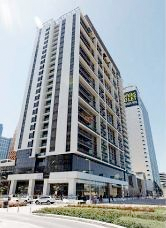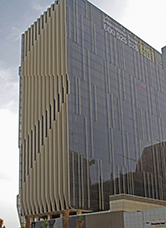From the partially completed top floor of the 26-storey International Tower in Abu Dhabi, amid the cement mixers and exposed steel, Richard Foulds has a clear view of the competition. Across the landscape new office towers, topped by cranes, push towards the sky, their glass skins half completed.
Most of these tall towers are looking for companies to fill their space, as is Mr Foulds, the director of the Abu Dhabi office for CB Richard Ellis (CBRE), which is marketing International Tower. "Long gone are the old days of Abu Dhabi, when you could build it and [tenants] will come," he says.
The battle for office tenants in the emirate is about to become extremely competitive as these new towers vie with existing complexes to woo companies.
More than 1.1 million square metres of office space is due to come on line in the next two years, a more than 50 per cent increase from the current 2.15 million sq metres.
"There is no doubt the competition will become fiercer," says Piers Barttelot, the head of Jones Lang LaSalle's Abu Dhabi office.
But that means good deals for companies looking for high-quality space and increased competition for new developments such as International Tower.
The building stands in Capital Centre, the cluster of office, retail and hotel towers under development close to the Abu Dhabi National Exhibition Centre.
Built on spec, the tower's developer SinoGulf is in "advanced talks" with several companies, says David Cockerton, the company's fund manager.
"Traditionally, this market does not look to take up space until buildings are completed," Mr Cockerton says. "A lot of people have been let down by developers who have not been able to deliver buildings on time." But he remains confident the quality of the project will lure law firms and energy companies eager to improve their space. Theproject adds about 41,000 sq metres of office space.
Developed by SinoGulf Investments, the project was conceived in 2007, when Abu Dhabi was one of the most expensive office markets in the world, with little empty space. Two years ago the average rent was about Dh4,750 (US$1,293) a sq metre. Today it is closer to Dh1,800, according to research by CBRE. "Clearly the market has changed," says Mr Cockerton. "But the fundamentals of the market and the need for high-quality space is still there."
International Tower fits that bill, the developer says. From the outside, the tower does not have the dramatic architectural flair of many built in the region over the past five years. It does not lean or curve. The design is a simple rectangle but the floor plans were specifically designed to allow the maximum number of people to occupy the space.
"The biggest draw is the design of the floor plan, which gives a huge amount of flexibility," Mr Foulds says. "We recognised long ago that Abu Dhabi wasn't catering to companies that needed functionality." Functionality over form is the new mantra in the office competition as tenants look for greater value for money, leasing agents say.
International Tower was designed to attract clients looking for Grade A space, which is still rare in Abu Dhabi. To be considered Grade A, buildings typically need good security, adaptable floor plans to allow easy installation of cables, high-speed lifts, extensive management maintenance schemes and ample parking.
Only about 20 per cent of the towers under construction offer Grade A space, CBRE says. Grade A does not mean marble statues and pretty water fountains in the courtyard, agents emphasise. There are certain tenants interested in opulence, who want their office to be the symbol of the company but those companies are rare these days. "You don't want to pay for gold taps if you don't need them," Mr Barttelot says.
Instead, the emphasis is focusing more on deals and value for money. Free rent periods of between three and six months, common in many cities but traditionally rare in Abu Dhabi, are fast becoming the norm. Landlords are also helping to fit out space for tenants. "In the past, landlords had all the power," Mr Quinn says. "Now landlords [in Abu Dhabi] have to do what landlords in the rest of the world do."
Already there have been signs of change. Last month the French engineering group Technip, which has offices scattered around Abu Dhabi, signed the largest deal in recent years.
The company has taken more than 20,000 sq metres in Guardian Towers, a new Abu Dhabi development in Danet, the cluster of residential and office towers under construction on Airport Road.
Technip is paying Dh1,250 a sq metre on a lease that will run for at least five years, a sharp discount on the current average of Dh1,800 a sq metre.
"As developers get closer to completion, the pressure is only going to increase [to make deals]," Mr Quinn says.





